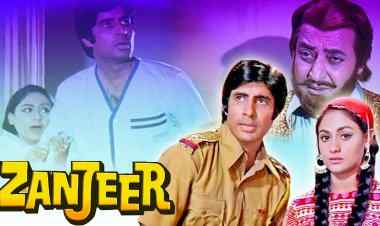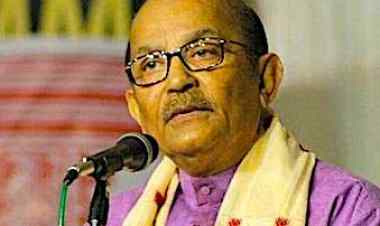Tribute: MRINAL SEN AT 100
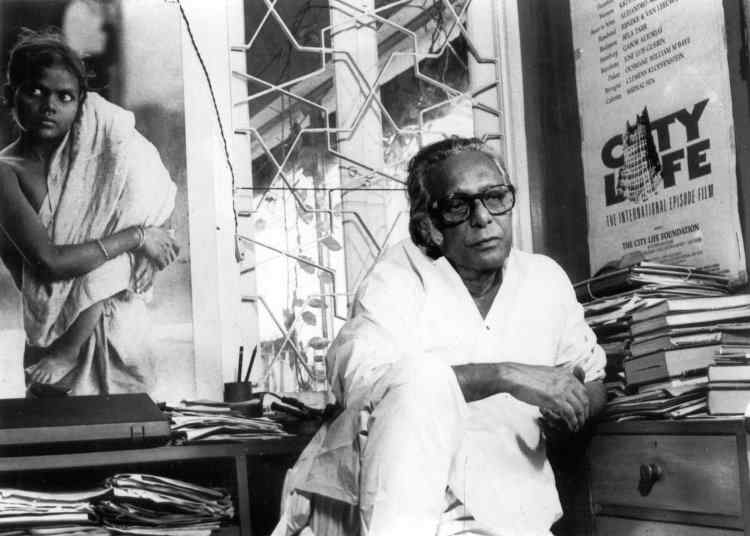
Film scholar and author, Dr. Shoma A. Chatterji pays her centenary tribute to MRINAL SEN, one of the legendary filmmakers in India.
The entire film and television world of Kolkata gathered in hundreds to celebrate and pay respects to filmmaker Mrinal Sen, a living legend of his time on the grand occasion of his 90th birthday. Film society members, filmmakers, actors and actresses, friends and colleagues arrived beating the Kolkata heat to crowd in the big auditorium of Gorky Sadan at Kolkata on May 14, 2012. He passed away almost a decade later, completely tied to the bed, conscious, aware but in constant state of lamenting the loss of his wife Geeta Sen, also a talented actress who chose to remain in the shadows.
Mrinal Sen was born in 1923 in Faridpur, presently in Bangladesh. His early films were heavily influenced by Marxist ideals. His first film was Raat Bhore (1956) and his second film Neel Akasher Neechay (1958) was banned by the government for two months. He is one of the pioneers of the New Cinema movement and made notable films include Bhuvan Shome, Baishey Shravana (1960), Punascha (1962), Akash Kusum (1956), the Calcutta trilogy: Interview (1970), Calcutta 71(1972) and Patalik (1973); Ek Din Pratidin (1979), Kharij, Akaler Sandhaney (1980), Khandhar (1983), Tasvir Apni Apni, Interview, Chorus and Parsuram. Unlike Satyajit Ray, his great contemporary with whom he is often compared, Mrinal Sen did not restrict himself to Bengali films. Besides Hindi, he also made films in Oriya and Telugu. Mrinal Sen also directed a 4-nation (India, France, Belgium, Switzerland) film, Genesis, which had music by Ravi Shankar. Recently, Mrinal Sen was appointed chairman of the international jury at the famous Sochi International Film Festival in Russia.
Sen met and fell in love with Geeta, a theatre actress in the days when most of the Bengali cultural intelligentsia was active with the Indian People's Theatre Association. They married and Geeta Sen remains to this day, the deepest influence on him after his mother. Geeta put in an appearance in almost every film her husband directed but chose to remain a housewife for the major slice of her time. Her performance in Sen's Khandhar, Akaaler Sandhane and Ek Din Pratidin were memorable. The Sens’ son, Kunal, a computer professional, settled in the United States is trying his best to help those who are engaged in creating an archival museum dedicated to his father.
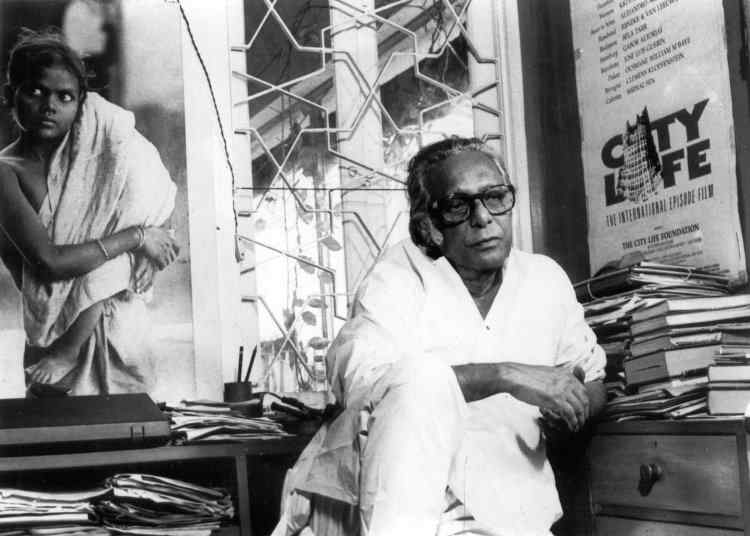
Commenting on the director-heroine liaison which is a typical of the world of cinema all over the world, Sen laughed and said "Sorry, but I am truly innocent in this scheme of affairs. I personally think that this happens because the young debutante star the director picks and hones to shape, begins to look up to him as an ideal, a role-model, and having spent a lot of time with him before, during and after shootings of several films, begins to depend emotionally on him too. It is just too easy for the director to return the emotional dependence after a period of time. Examples of director-star liaisons are just too many to mention. The Guru Dutt-Waheeda Rehman story comes at once to mind. But it never happened in my case" and with a laugh, adds, "my wife will vouch for this."
For those who are not aware, Mrinal Sen introduced two stellar performers who made history in Indian cinema. One is Amitabh Bachchan "whose voice I used for the first time in my film Bhuvan Shome and Madhabi Mukherjee, "whose teeth needed a lot of fixing before she could make her debut in my film." Sen saw Bachchan at K.A.Abbas' house when he was screening actors for his Saat Hindusthani. "Somehow, the lanky young boy's eyes and voice fascinated me" he says. The rest, as the clichéd saying goes, is history. Bachchan also turned narrator for Satyajit Ray’s Shataranj Ke Khilari, Amir Khan’s Lagaan and some other films. “When I paid him a paltry sum for the voice-over job, he modestly refused to accept it until I insisted that it was a professional job both for him and me and he accepted with a gentle smile,” said Mrinal-da.
Responding to a question about what drove him to direct films, Sen said, “It was almost an accident. It happened when I was in college. A voracious reader, I would regularly frequent the Imperial Library, now called the National Library, in Calcutta. I read everything from Marx to Nietzche, from Shakespeare to the Shahnama. One day, as I was relaxing with cards in the catalogue room, I chanced upon Rudolf Arnheim’s historic book, Film. I found the book riveting and even charismatic. This led me on to read everything and anything on cinema. I was also wearying of the crop of Indian and American films I had begun to see. The love for books on cinema inspired in me the love for good cinema. This, juxtaposed against the real-life experience of watching films I did not quite care for, egged me on to write on the subject. I wrote articles on the dialectics of cinema which were published in papers. I involved myself more directly by directing a film. The film was called Raat Bhor (1956.) As I look back, I see I was destined to be a filmmaker though I was never trained to be one. It was really pure accident. What else could I have been - a loafer loafing about without any sense of direction or aim?”
About whether the progress in technology in filmmaking had affected the aesthetics and content of filmmaking, Sen said, “I have tremendous respect for technological progress when I see this through the works of directors like Spielberg. I never debate the objectivity of the situations depicted by Spielberg. He does a lot of research. But there is no aesthetics in it. When I saw Schindler’s List, I felt the film lacked soul. Yet, I fell in love with its violence. To be objective and to have a sense of history are two very different things. Spielberg lacks this sense of history. He would not make you hate Nazism the way some anti-Semitic films of Eastern Europe did in the Sixties. Sometimes, all this technical wizardry makes me feel I am watching magic, not a film. I am not against technical progress but what if next year the best actress award goes to a robot?”
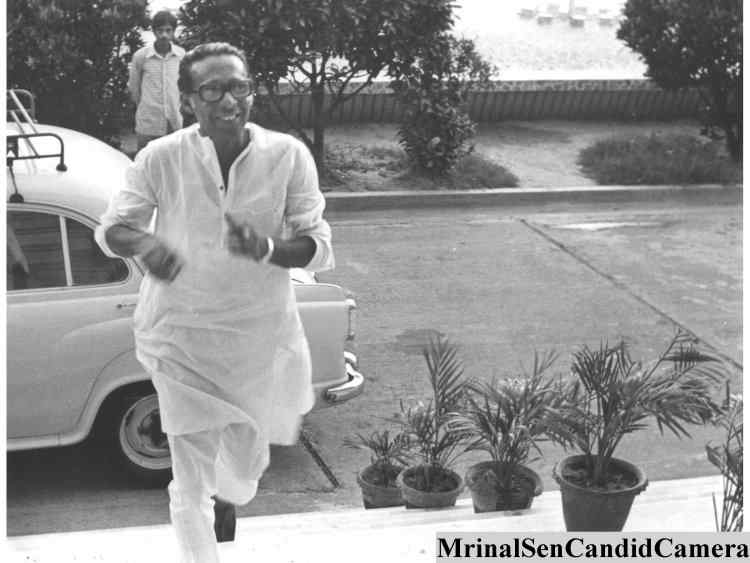
Mrinal Sen is not just a name. He is a legend. He is a cult figure. He represents an era that survives and reflects itself through him. He is the lone ranger in a track that is now filled with other people, other cinemas, and other worlds. But he holds on to his own principles. While he was mobile, he was prominently visible at book exhibitions, play premieres, film festivals, special screenings, art shows for charitable causes and diplomatic parties. The anger of yesteryear had given way to a strange cynicism, a sort of biting satire charismatic enough to attract you, and scaring enough to pull yourself away from him. Age invests a person of his status with the reverence that prevents you from attacking him with questions he may not like to answer. Problem is – there is hardly a question he did not like to answer.
He would always be happy to allay your fears and set your intrigue to rest. Spiking his answers with the right dose of barbed smiles and caustic one-liners, Mrinal Sen, the doyen of India’s parallel cinema, faced every question with the brashness and courage of a young soldier. He was a man who is warm and pleasant to be with because he was very anecdotal and never inclined to didacticism in any way. Though he was extremely knowledgeable and aware of everything around him, he never threatened you with his intellectual inputs. “Anecdotes make life interesting. Theory is boring,” he said. He would quote anecdotes all the way and each one was as good as – if not better than – the other was. He was also an extremely unpredictable man. Just when everyone was convinced that he was suffering from a mental block so far as film-making went, his last film to hit the screen in 1993, surprised us all by making a beautiful film, Amar Bhubon (This, My Land) inspired by a news item he had watched on a news channel.
****
What's Your Reaction?





















































